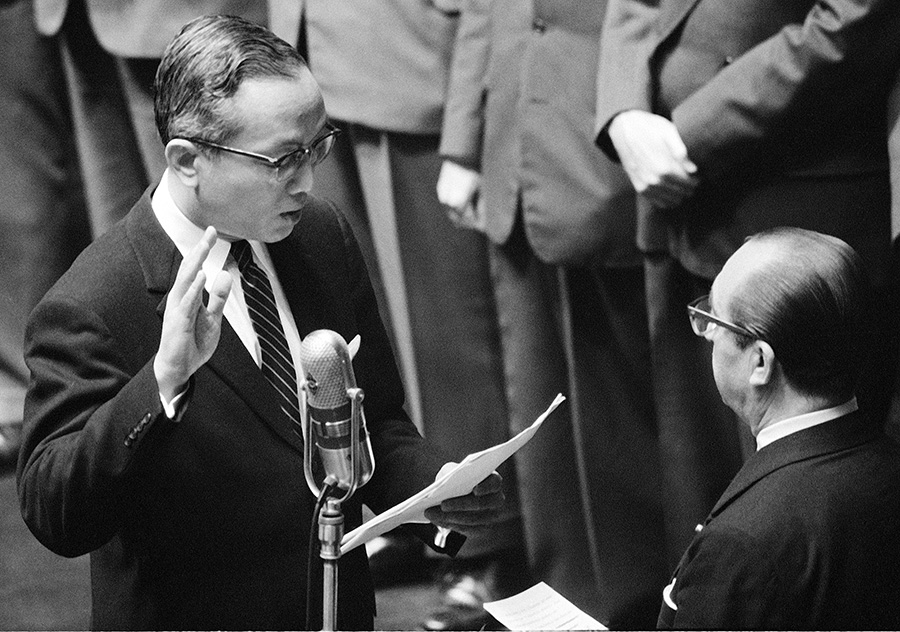During his 10 years as UN secretary general, the late U Thant proved a straight-talking, self-assured and effective diplomat. Decades after his death, The Irrawaddy’s Aung Zaw opined that the current crop of Asian leaders would be hard pressed to match his legacy in the post. On U Thant’s 109th birthday, The Irrawaddy revisits this article from its September 2006 edition.
If the job goes to Asia for the first time in 35 years, the late Burmese diplomat will be a hard act to follow
Will an Asian succeed UN Secretary-General Kofi Annan when he ends his final five-year term in December?
Although there is no strict geographical rotation system for the job, many feel that it is time it went to an Asian again—for the first time since Burma’s U Thant completed a double stint in 1971. US President George W Bush recently indicated that Washington will support an Asian candidate, and despite the increasing difficulties of holding the top job there is no shortage of aspirants in Asia.
They include Surakiart Sathirathai, one of Thailand’s deputy prime ministers, India’s Shashi Tharoor, currently the UN’s under secretary-general for communications and public information, South Korean Foreign Minister Ban Ki-Moon, and Sri Lankan Jayantha Dhanapala, a former UN under secretary-general for disarmament.
The first UN secretary-general, Trygve Lie, once described the UN post as the most impossible job on earth. But that won’t deter Asian candidates who sometimes audaciously lobby for the job. One of them is Surakiat Sathirathai, a former foreign minister who has backing from Asean and reportedly also from the Chinese. But he faces political troubles at home, especially from human rights groups, and where he has a reputation for confronting opponents by issuing libel actions against them.
In a late attempt to curry favor, Surakiart told Asean he would push for democratic reforms in Burma if he is chosen to replace Annan. Many Burmese would say this will not be an easy task.
Burma and the UN have had an uneasy relationship in recent years as the junta came under strong criticism, if little action, from the New York body. But 40 or so years ago, Burma’s image at the UN was much brighter—thanks to the decade-long reign of U Thant as UN chief from 1961.

U Thant started out as Burma’s permanent representative at the UN before becoming acting secretary-general after incumbent Dag Hammarskjold died in a plane crash. U Thant, 52, subsequently held the job until 1971.
Colleagues at the UN said that Hammarskjold and U Thant came from two different worlds: one, a Swedish aristocrat, reserved and aloof; the other modest, down to earth and outspoken. Those who knew them well dubbed Hammarskjold the “eastern mystic,” while U Thant was judged “direct, almost Western.”
U Thant’s press secretary, Rames Nassif, recalled in his book “U Thant in New York, 1961-1971,” that his boss had a straight-talking but also humorous manner. For example, there was a rumor at UN Headquarters that the French disdained U Thant for being “too short” and not speaking French. U Thant heard the rumor and told his friends that he was taller than Napoleon, who did not speak English.
U Thant quickly proved to be a fine and self-composed diplomat who could easily mingle with the world’s most powerful leaders — from Moscow’s Soviet Premier Nikita Khrushchev, with whom he swam in the Black Sea, to Pope Paul VI.
Former UN under secretary-general Brian Urquhart once recalled: “In a series of critical situations, U Thant used his limited constitutional authority to the utmost to pre-empt or to curtail disaster.”

Indeed, several conflicts were waiting to test his skills and ability. U Thant was involved in the Cuban missile crisis, the Vietnam War, and conflict between India and Pakistan in 1965. Colleagues who traveled with him to crisis zones recalled that on many occasions U Thant made bold and single-minded attempts to restore peace.
But he was blamed for failing to solve the Middle East conflict in the 1960s, although well defended by Urquhart: “U Thant proved a useful scapegoat for the Middle East War of 1967, but it is less often recalled that he was the only world statesman who went to Cairo before that war to reason with President Nasser.”
U Thant was also instrumental in securing China, emerging from world isolation, a seat in the UN. And he was media savvy and friendly to the press.
Nassif recalls: “For U Thant, the press conference was a pleasant experience. He had natural warmth towards journalists and was comfortable with them. He enjoyed thinking of himself as a former journalist, and often mentioned this. He was keenly aware that an enlightened information program was essential for the success of the United Nations.”
Kofi Annan agrees.

















